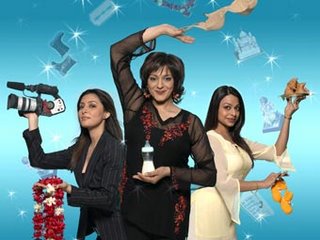How accurately are Asians represented in “Life isn’t all ha ha hee hee?”
In many respects “Life isn’t all ha ha hee hee” was the first drama series (May 2005) which did not represent Asians in stereotyped and clichéd ways (evident from BBC reviews). However, after thorough analysis this may too seem inaccurate since with an attempt to make Asians look ‘normal’ it may have resulted in superficiality of the characters. Therefore, by investigating the accuracy of such representations considering all the wider contexts should prove to be an interesting independent study.

Media language: The format being a drama series would mean a majority of close up/medium shots to demonstrate the gripping emotional side of the drama since it portrays a tale of betrayal, forgiveness and ultimately friendship.
Institution: BBC-remit of entertain, inform and educate. Has the obligation to represent Asians accurately-does it?
Genre: drama series adapted from Meera Syal’s bestselling novel- tale of friendship and shocking betrayal, conventions include twists, vast amounts of empathy and sympathy and use of cliffhangers in order to increase the anticipation of the next episode.
Representation: Many argue that the drama is relevant to all people despite ethnic origin however ultimately it’s an all-Indian cast. Does the drama employ positive/negative stereotypes, does it try too hard to demonstrate that Asians are fully integrated into society or does it actually succeed in breaking away from pigeonholed representations?
Audience: Primary-Asians Secondary- All other ethnic groups-attempts to break into mainstream, shown after watershed so was aimed at older audiences.
Ideology and values: Postmodernism, feminist, patriarchy and Marxist-dominant ideologies.
Narrative: Todorov-twists and cliffhangers.
Social context: does the programme show that Asians have embraced British culture, role of women-rise of Feminism. Multicultural society-acceptability of such a programme.
Historical context: influx of Asians in the 60s-have stereotypes changed or are they relative (postmodern)?
Economical context: Brown pound, the funding of Asian lifestyle dramas.
Political context: The role of the labour party-more integration and opportunity to climb the occupational ladder. Perhaps programme reflects political mood of Britain; uncertainty?
Other texts: “Anita and Me,” “East is East,” “Bradford Riots,” “Goodness Gracious me” and “Bend it like Beckham.”
Theorists/theory: Laura Mulvey, Marxist (oppression of Asians via capitalist/dominant ideology), Feminism-liberation/oppression, Patriarchy in Asian culture, 'racial clown'- Stuart Hall.

0 Comments:
Post a Comment
<< Home